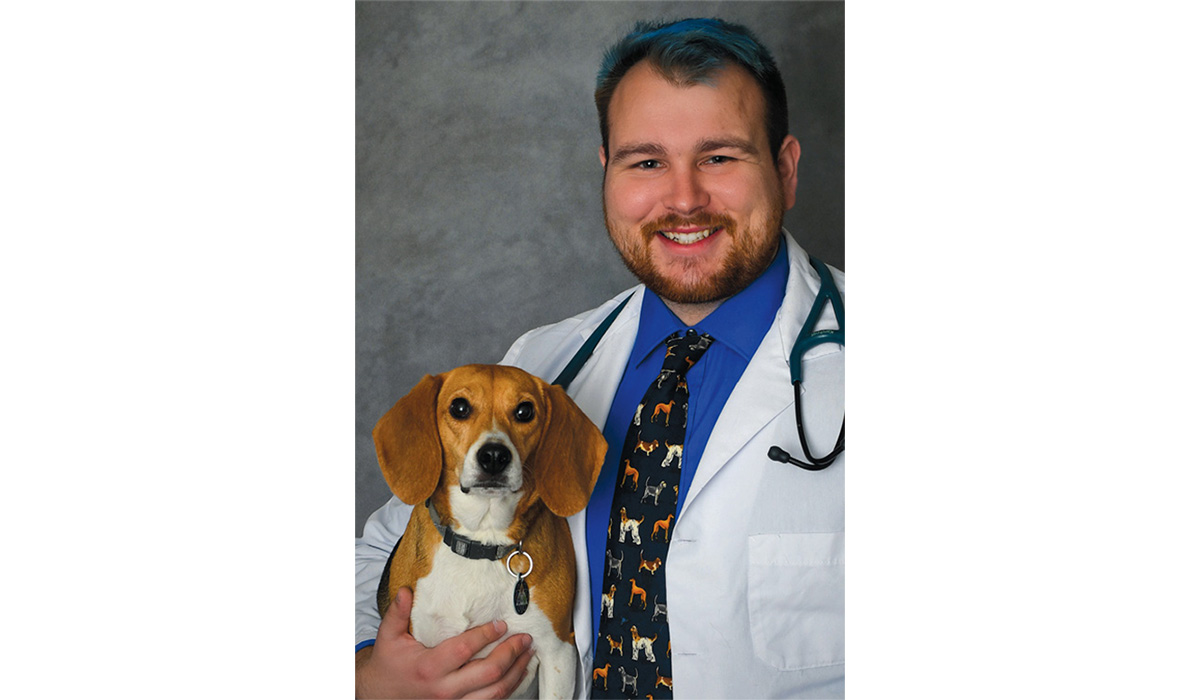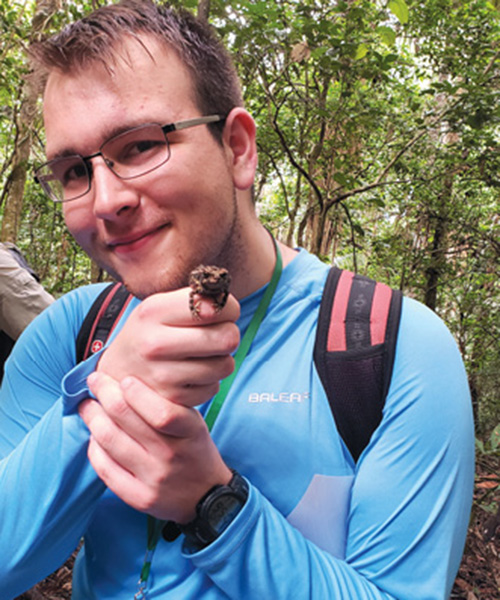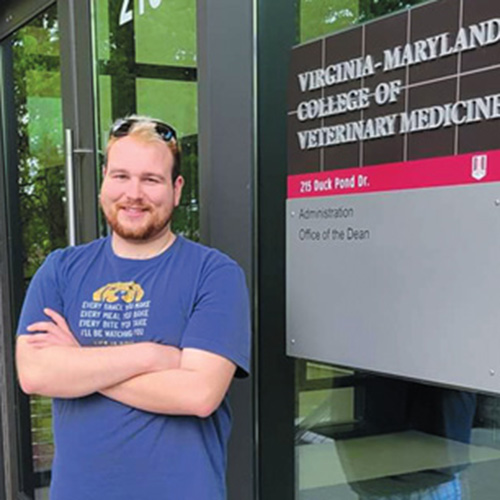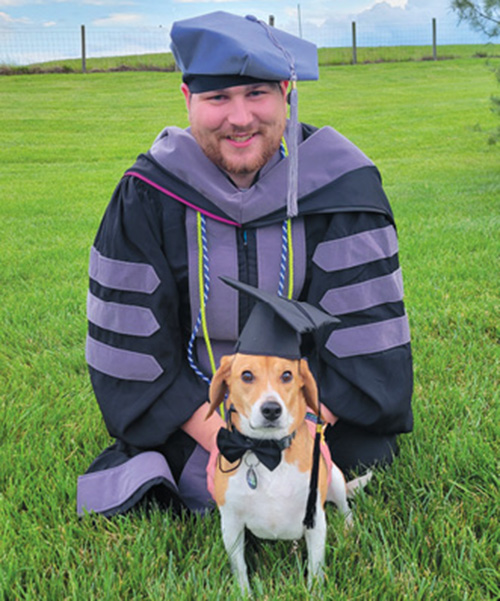
Anewly triaged cat with a urinary blockage is whisked past the familiar guilty appearance of a Labrador who snatched a bowl of chocolates from the countertop. The ICU hums with activity from the symphony of chirping fluid pumps amid conversations among doctors, nurses, and even the patients themselves. It’s all in a day’s work for Dr. Mike Karchner Jr. ’19, a veterinarian at BluePearl Pet Hospital in Cary, North Carolina. Karchner’s busy schedule fills with opportunities to help animals while he pursues advanced professional training as a member of BluePearl’s rotating internship program cohort.
Inspired by his grandfather to become a veterinarian, he eyed colleges encouraging introspection and personal growth, including Gettysburg College, which he learned about from two high school classmates, Andrew Mahoney ’17 and Karl Segletes ’18. After applying his senior year and visiting during Get Acquainted Day, he witnessed the College’s supportive community and knew he wanted to attend Gettysburg.
On campus, Karchner, a biology major with a double minor in music and business, encountered a rigorous curriculum. His coursework, professors, and classmates challenged his perceptions of the world, introduced him to a breadth and depth of knowledge across multiple disciplines, and built enduring skills he’s relied on throughout his career.
He credits Biology Prof. Michael Caldwell and Prof. Alex Trillo with imparting their knowledge on vertebrate zoology and animal behavior. As part of Trillo’s tropical terrestrial ecology course, Karchner participated in a three-week research trip to Peru. There, he explored the world of wildlife in the Andes Mountains and the Amazon River basin.
Participating in the Bullets Marching Band, Wind Symphony, and Symphony Band through the Sunderman Conservatory of Music allowed him to develop his collaboration, problem-solving, and teamwork skills. Performing in these ensembles prepared him to work with others outside the classroom as a veterinary assistant with Parkway Veterinary Hospital in Marmora, New Jersey, and beyond Gettysburg during his studies at the Virginia-Maryland College of Veterinary Medicine.
In 2017, Karchner was awarded the Entrepreneurial and Social Innovation Initiative Fellowship for Pet-Viser, a startup proposal for a smartphone app that would provide an accessible, curated resource to answer pet owners’ pressing questions: “What type of food should I feed to my pet?” “How do I keep track of all these vaccines and preventives?” “Should I take my pet to the ER now or can this wait until the morning?”
Karchner then teamed up with Bill Heyman ’74, P’13; Bill Huss ’75; and Paul Nix ’74, P’10. These alumni mentors offered him real-world perspectives based on their entrepreneurial experiences building a fledgling business concept into a robust marketable product. While Karchner’s Pet-Viser did not make it to market, he believes the fellowship experience allowed him to develop a systems-based approach to problem solving, which he’s relied on in his career.
“It is easy to focus solely on the seemingly obvious fix; however, better quality or more practical solutions are often waiting to be found if you are willing to take a step back and see the bigger picture.”
“Building Pet-Viser as a product and business challenged me to think about a problem from new, often unfamiliar perspectives. In veterinary medicine, like business, you need to understand how things are interrelated. It is easy to focus solely on the seemingly obvious fix; however, better quality or more practical solutions are often waiting to be found if you are willing to take a step back and see the bigger picture,” he said.
Through the fellowship, Karchner discovered that his product couldn’t match the quality of pet owners’ trusted sources for information—their own veterinarians. “Now that I am that trusted advisor for so many people, I feel well prepared to make gold-standard medical recommendations that are practical, financially feasible, and emotionally informed.”
Karchner’s Gettysburg education also provided the three C’s that prepared him for veterinary studies and his career: communication, collaboration, and context.



“I learned how to take information, synthesize it, and present it in an understandable way for any audience—veterinarians, the scientific community, or a pet owner,” he said. “I owe collaboration to the team-oriented environments fostered through working in the labs and music ensembles. Veterinary medicine is a team job. I’m working with paraprofessionals who are specialists and general practitioners. We’re all trying to get to the same goal of offering the best treatment for a patient.”
He acknowledges Gettysburg’s multidisciplinary approach for instilling new perspectives and making connections.
“That’s where I credit a lot of my ability to communicate effectively, especially in scientific and medical topics,” he said. For example, even similar clinical cases he encounters can differ due to a pet owner’s goals or resources.
“It’s important to understand the context of those situations you deal with because you cannot take a one-size-fits-all approach,” he said. “When I got into my career, I was able to more easily identify patterns and explore them—not just in the context of my job, like diagnosing a disease or figuring out a treatment plan, but explaining the patterns and relationships to a pet owner.”
Reflecting on his passion for veterinary medicine, Karchner credits Gettysburg’s consequential education for providing the roots and wings to help students like him pursue a life of purpose.
“It’s education that opens doors and opportunities for you and guides you to where they are,” he said. “Your degree is like the key on a keyring. It opens those doors. It gives you the tools you need for a consequential life where you can make material change and do material good with the knowledge and skills you have built.”
by Michael Vyskocil
Posted: 07/15/24